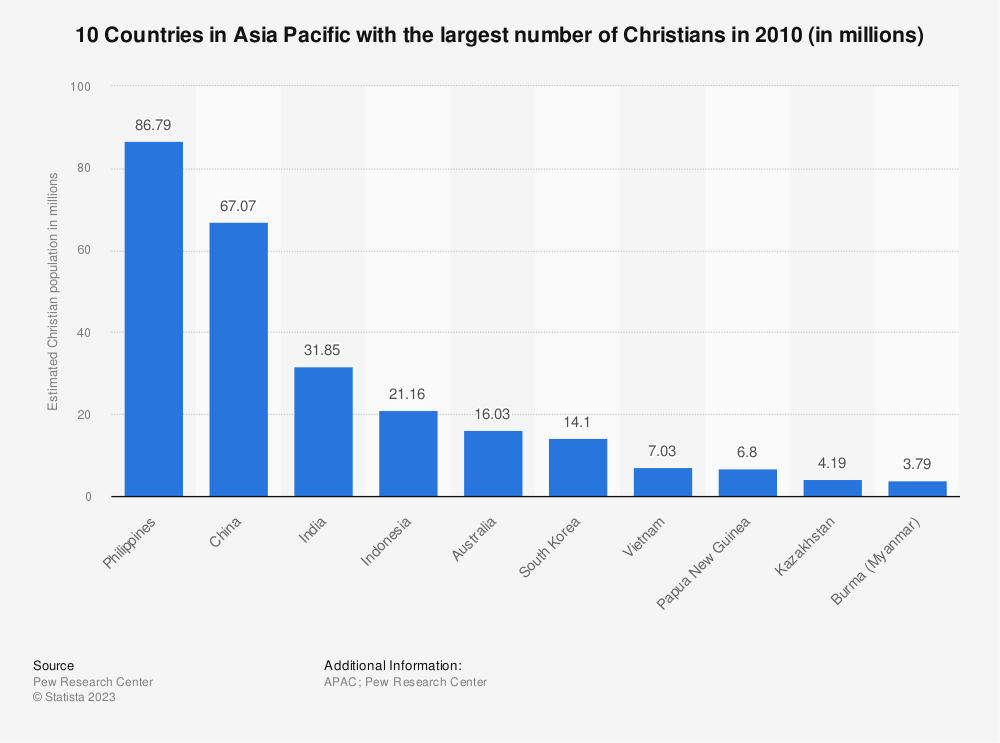Christianity is the third-largest religion in Asia, with over 300 million adherents. It is the dominant religion in the Philippines, Timor-Leste, and Armenia, and has a significant presence in India, Indonesia, China, and Russia.
The following is a list of the top 20 Christian countries in Asia, based on the percentage of the population that is Christian:
Top 20 Christian Countries in Asia by Percentage Christian
Christianity is the largest religion in Asia by population, with over 300 million Christians. The top 20 Christian countries in Asia by percentage Christians are:
- Philippines (85.3%)
- Timor-Leste (98%)
- Armenia (98.7%)
- South Korea (29.2%)
- Georgia (88.6%)
- Russia (73.6%)
- Kazakhstan (25%)
- Lebanon (40.5%)
- Syria (10%)
- Iraq (4%)
- Myanmar (6.2%)
- Sri Lanka (8%)
- Pakistan (1.5%)
- Uzbekistan (3%)
- Japan (2%)
- Malaysia (9.10%)
- Indonesia (10.48%)
- China (3% – 5%)
- India (2.3%)
- Taiwan (4.5%)
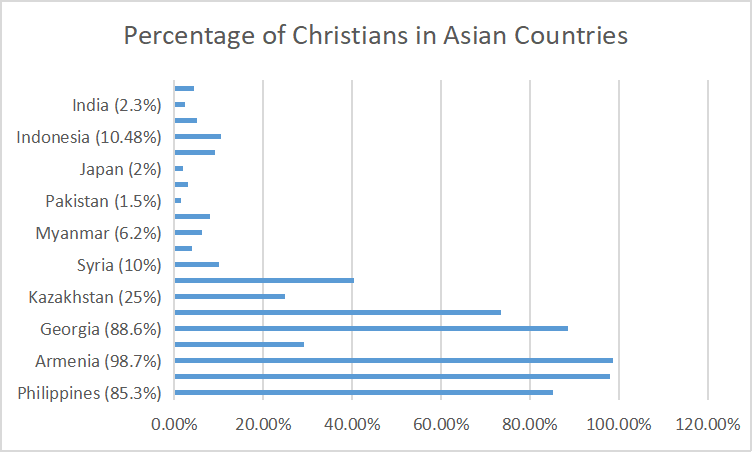
Christianity in Asia
Christianity has a long history in Asia, dating back to the early centuries of the Common Era. The first Christians in Asia were probably merchants and missionaries from the Middle East.
Christianity spread rapidly in Asia during the Middle Ages, especially through the work of Nestorian missionaries. Nestorian Christianity was the dominant form of Christianity in Asia for centuries, but it declined in the 13th century after the Mongol invasions.
In the 16th century, Christianity began to spread again in Asia, this time through the efforts of Catholic and Protestant missionaries. The Catholic Church achieved particular success in the Philippines, while Protestant missionaries were more successful in China and Japan.
Today, Christianity is a diverse religion in Asia. There are a variety of Christian denominations in Asia, including Catholicism, Protestantism, and Orthodoxy.
Top 20 Christian Countries in Asia
Asia is the largest continent in the world, and it is also home to a diverse range of religions. Christianity is one of the largest religions in Asia, with over 300 million Christians living in the region. The top 20 Christian countries in Asia include:
1. Philippines
The Philippines is a Southeast Asian country located in the western Pacific Ocean. It is an archipelago of over 7,600 islands, with a total population of over 108 million people. The Philippines is the most populous Christian country in Asia, with over 92 million Christians. Christianity is the dominant religion in the Philippines, with over 85% of the population identifying as Christian. The majority of Christians in the Philippines are Catholic, but there is a significant Protestant minority.
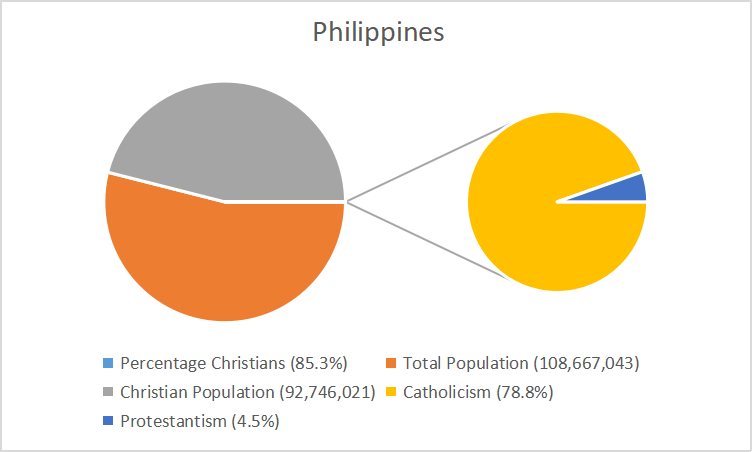
Christianity was first introduced to the Philippines by Spanish missionaries in the 16th century. The Spanish ruled the Philippines for over 300 years, and during that time, they converted the majority of the population to Christianity. Today, the Philippines is a secular country, but Christianity remains the dominant religion.
The Catholic Church plays an important role in Philippine society. The Church is involved in a wide range of activities, including education, healthcare, and social services. The Church also has a strong influence on Philippine politics and culture.
Protestantism is also a significant presence in the Philippines. The largest Protestant denomination in the Philippines is the Iglesia ni Cristo. Other Protestant denominations include the Baptists, Methodists, and Presbyterians.
Christianity has had a profound impact on Philippine culture. Christian values such as family, community, and hard work are highly valued by Filipinos. Christianity has also influenced Philippine art, music, and literature.
2. India
Christianity has a long and rich history in India, dating back to the first century AD. It is believed that the Apostle Thomas traveled to India and established a Christian community there. Christianity spread throughout India over the centuries, and today there are over 26 million Christians living in the country.
Christians make up about 2.3% of the Indian population, making it a minority religion. Hinduism is the dominant religion in India, with over 79% of the population identifying as Hindu. However, Christians play an important role in Indian society, and they are involved in all aspects of Indian life.
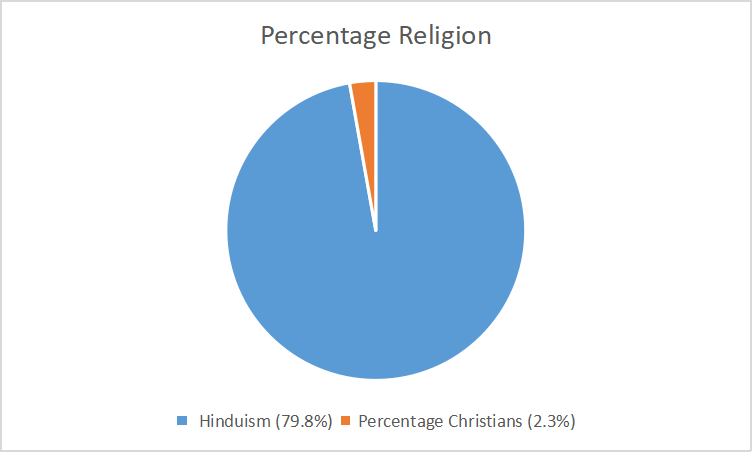
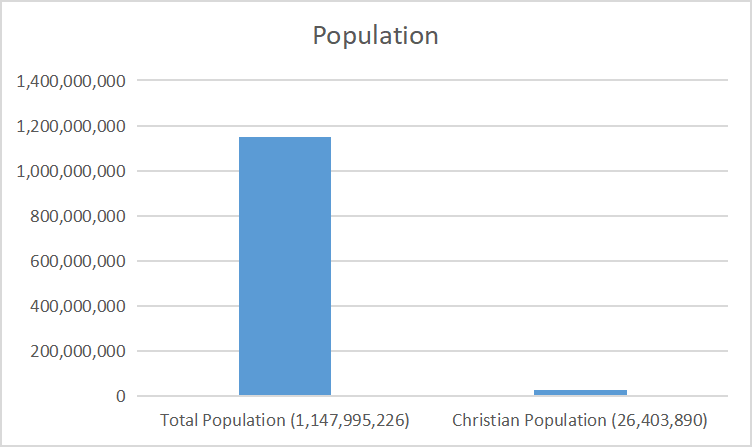
The majority of Christians in India are Protestant, but there is a significant Catholic minority. There are also a number of other Christian denominations in India, including Orthodox Christians, Baptists, Methodists, and Presbyterians.
Christians in India live in all parts of the country, but they are concentrated in certain areas, such as Kerala, Tamil Nadu, and the Northeast. Christianity is also growing rapidly in urban areas, such as Mumbai, Delhi, and Bangalore.
Christians in India face a number of challenges, including religious persecution and discrimination. However, they are also making significant contributions to Indian society in the areas of education, healthcare, and social development.
3. Indonesia
Indonesia is the third most populous Christian country in Asia, with over 29 million Christians. Christianity is a minority religion in Indonesia, making up about 10.48% of the population. The majority of Christians in Indonesia are Protestant, but there is a significant Catholic minority.

Christianity has a long history in Indonesia, dating back to the Portuguese colonial period in the 16th century. The Dutch later took control of Indonesia in the 17th century, and they brought Protestantism to the country. Christianity spread rapidly in Indonesia during the colonial period, and it continues to grow today.
Indonesian Christians are a diverse group of people. They come from all over the country, and they represent a wide range of ethnic and cultural backgrounds. The majority of Indonesian Christians live in the eastern part of the country, where they make up a significant majority of the population in some provinces.
Indonesian Christians play an important role in their communities. They contribute to the economy, the arts, and the sciences. They are also active in social and political life.
4. China
China is the fourth most populous Christian country in Asia, with an estimated 39 to 67 million Christians. Christianity is a minority religion in China, making up about 3% to 5% of the population. The majority of Christians in China are Protestant, but there is a significant Catholic minority.

Christianity has a long history in China, dating back to the 7th century. However, it was not until the 19th century that Christianity began to grow rapidly in China. This growth was due in part to the efforts of foreign missionaries and to the rise of Chinese nationalism.
In the 20th century, Christianity experienced a period of persecution under the communist government. However, since the 1980s, there has been a resurgence of Christianity in China. Today, Christianity is one of the fastest-growing religions in China.
There are a number of reasons for the growth of Christianity in China. One reason is that Christianity offers a message of hope and salvation that resonates with many Chinese people. Another reason is that Christianity provides a sense of community and belonging for many Chinese people. Additionally, Christianity is seen by many Chinese people as a way to connect with the West.
The growth of Christianity in China has had a number of impacts on Chinese society. One impact is that Christianity has helped to promote religious tolerance in China. Another impact is that Christianity has helped to promote social justice and human rights in China. Additionally, Christianity has helped to promote economic development in China.
The future of Christianity in China is uncertain. However, the fact that Christianity is growing rapidly in China suggests that it will play an increasingly important role in Chinese society in the years to come.
5. Russia
With approximately 73% of Russians Christian, Christianity dominates. The Russian Orthodox Church, one of the oldest and largest in the world, is home to most Russian Christians. Christianity has shaped Russian culture and society for millennia.
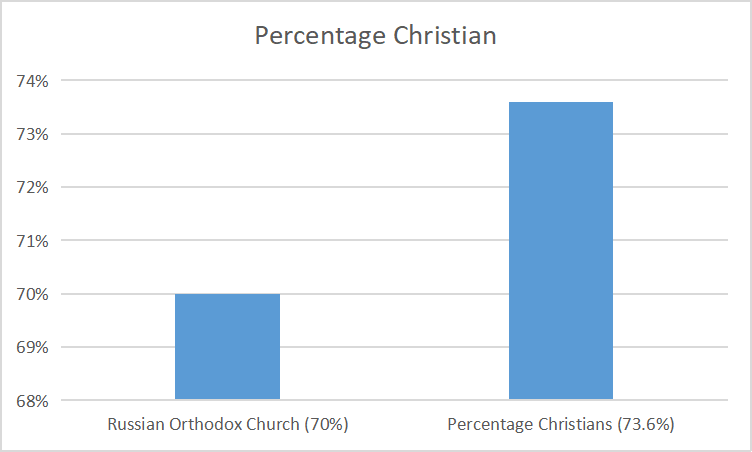
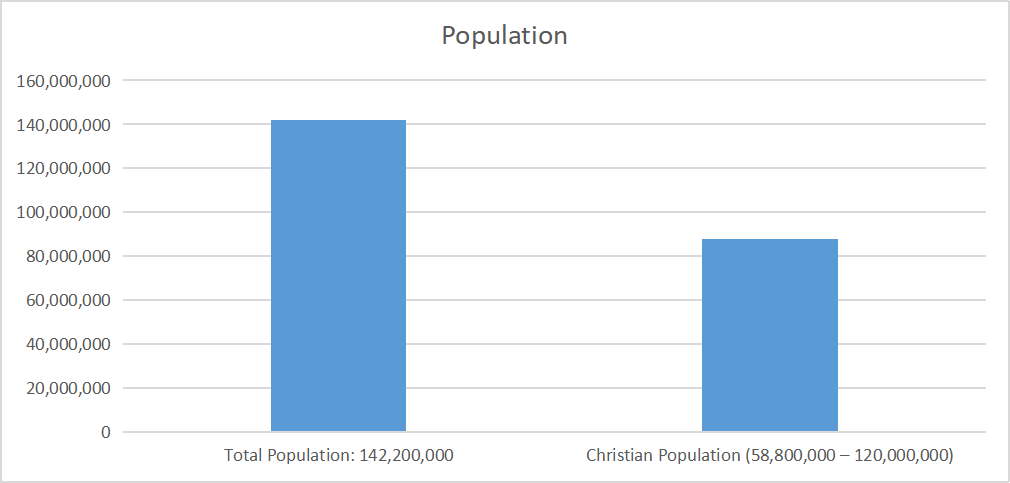
Prince Vladimir of Kiev baptized his people in the 10th century, introducing Christianity to Russia. Christianity dominated Russia by the 11th century after spreading swiftly. The Russian Orthodox Church shaped Russian culture and society. It founded schools, hospitals, and monasteries and spread Christianity across Eastern Europe.
Russia’s Orthodox Church is a major religious institution. The world’s largest Orthodox Christian church has over 100 million members. The Patriarch of Moscow and All Russia is the highest religious authority in Russia.
Orthodox Christianity has shaped Russian history and culture. It has guided Russians spiritually and morally and shaped their national identity.
Christianity has greatly influenced Russian culture and society. It inspired Russian literature, art, music, and architecture. Russian ideals and customs were also shaped by Christianity.
Christianization is developing in Russia. In recent years, religious interest has grown in the country. The Russian Orthodox Church is becoming more significant in Russian society, and it will certainly continue to do so.
6. Vietnam
Christianity is a minority religion in Vietnam, with about 8% of the population identifying as Christian. The majority of Vietnamese Christians are Catholic, but there is also a significant Protestant minority. Christianity began to spread in Vietnam in the 16th century, and it has grown steadily since then.
Vietnam’s religious landscape is characterized by a blend of beliefs, with Christianity having a notable presence. The dominant religious affiliation in Vietnam is irreligion, with about 70% of the population identifying as non-religious. Other major religions in Vietnam include Buddhism (10%), Hinduism (0.6%), and Islam (0.1%).
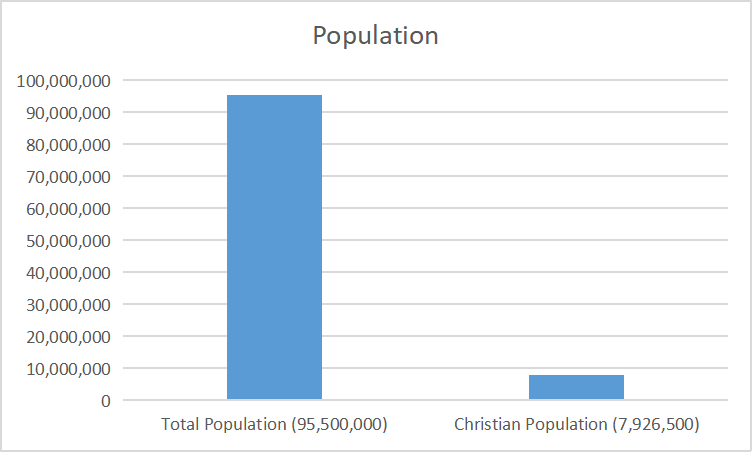
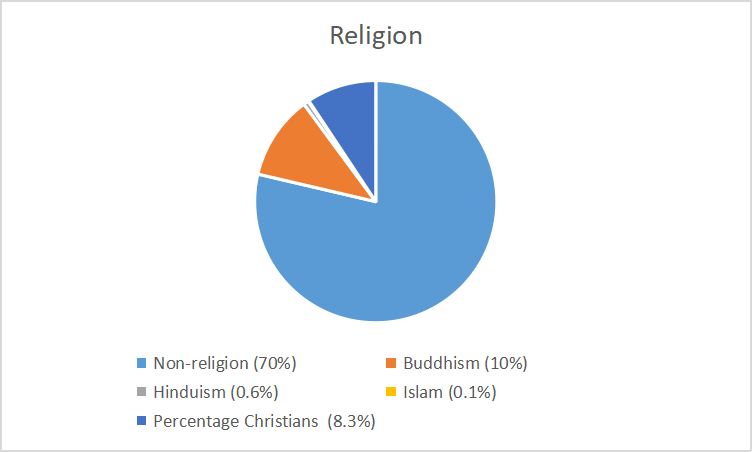
Christianity has played a significant role in Vietnamese history and culture. In the 19th century, Christianity was used by French missionaries to justify French colonization of Vietnam. However, Christianity also played a role in the Vietnamese resistance movement against French rule. In the 20th century, Christianity was suppressed by the communist government of Vietnam. However, since the 1980s, religious freedom has increased in Vietnam, and Christianity has begun to grow again.
Today, Christianity is a vibrant and growing religion in Vietnam. There are an estimated 7.9 million Christians in Vietnam, and the number of Christians is growing each year. Christians in Vietnam play an important role in society, and they are active in a variety of fields, including education, healthcare, and social services.
7. South Korea
South Korea has a rich religious history, and Christianity is one of its main religions. A 2020 survey found 29.2% of South Koreans are Christians, a minority religion. 46.5% identify as irreligion, folk religion, or Confucianism. Which means that there are 24.3% of people in South Korea who identify with another religion or who do not identify with any religion at all. However, In recent decades, South Korea has become one of the fastest-growing Christian populations in the world.

A large Catholic minority exists in South Korea, where most Christians are Protestant. Protestant missionaries from the US and Europe extended Christianity to South Korea in the 19th century. Christianity swiftly became popular in South Korea and helped modernize and grow the country.
Christians in South Korea are important in all parts of society. They work in government, business, education, and arts. Christians also help others.
Christianity in South Korea is growing for many reasons. Many South Koreans relate to Christianity’s message of hope and salvation. Another factor is that Christianity gives many South Koreans a sense of community. Many South Koreans consider Christianity as a link to the West.
Christianity has changed South Korean society. Christianity has promoted religious tolerance in South Korea. Christianity has also promoted social justice and human rights in South Korea. Christianity has also boosted South Korean economic growth.
8. Armenia
Armenia is a small country in the Caucasus region of Eurasia. It is bordered by Turkey to the west, Georgia to the north, Azerbaijan to the east, and Iran to the south. Armenia has a population of about 3.3 million people, and the vast majority of them (98.7%) are Christian.

Christianity is the dominant religion in Armenia, and it has played a central role in Armenian identity and culture for centuries. The Armenian Apostolic Church is the oldest Christian church in the world, and it is the largest denomination in Armenia. The Armenian Apostolic Church is an Oriental Orthodox church, and it is not in communion with the Roman Catholic Church or the Eastern Orthodox Church.
Armenia is a proud Christian nation, and it is home to many important Christian sites, including the Etchmiadzin Cathedral, the Khor Virap Monastery, and the Tatev Monastery. The Etchmiadzin Cathedral is the seat of the Catholicos of All Armenians, the head of the Armenian Apostolic Church. The Khor Virap Monastery is where Saint Gregory the Illuminator, the patron saint of Armenia, was imprisoned for 13 years. The Tatev Monastery is one of the most important religious and cultural centers in Armenia.
Christianity has had a profound impact on Armenian culture. Armenian Christians have made significant contributions to art, literature, music, and architecture. Armenian Christians have also been at the forefront of the Armenian struggle for independence and freedom.
Armenia is a unique and fascinating country with a rich Christian heritage. It is a country that is proud of its Christian identity, and it is a country that is committed to preserving its Christian culture.
9. Georgia
Georgia is a country located in the Caucasus region of Eurasia. It is bordered by Russia to the north, Turkey to the southwest, Armenia to the south, Azerbaijan to the east, and the Black Sea to the west. Georgia is a Christian country, with over 88% of the population identifying as Christian. The majority of Georgian Christians belong to the Georgian Orthodox Church, which is one of the oldest Orthodox Christian churches in the world.
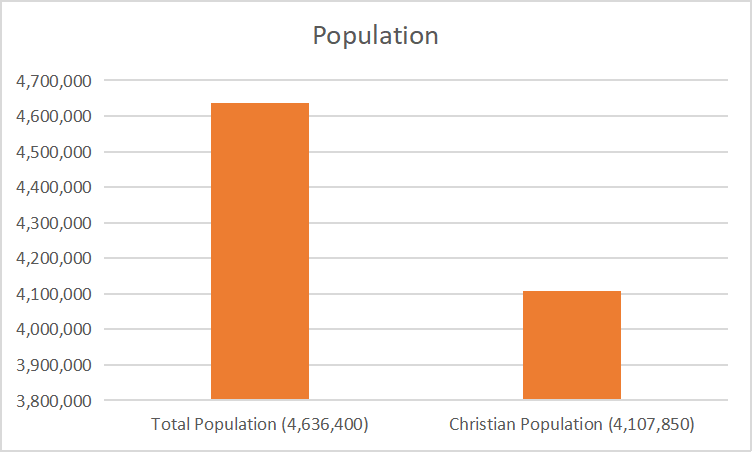
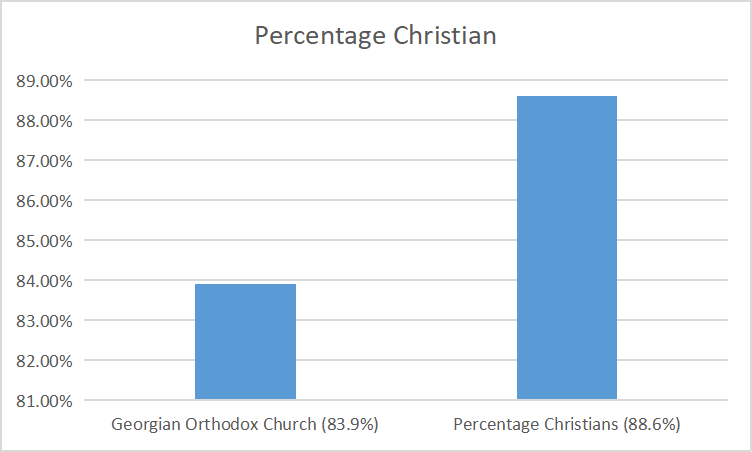
Christianity has played a central role in Georgian identity and culture for centuries. The Georgian Orthodox Church is the largest religious institution in Georgia, and it plays a pivotal role in Georgian society. The Church is involved in a wide range of activities, including education, healthcare, and social welfare.
Georgia has a rich Christian history. Christianity was first introduced to Georgia in the 1st century AD by the Apostle Andrew. The country adopted Christianity as its official religion in the 4th century AD. Georgia has been a Christian country ever since, and it has played an important role in the development of Christianity in the region.
Georgia is home to a number of important Christian sites, including the Svetitskhoveli Cathedral, the Gelati Monastery, and the David Gareji Monastery. These sites are popular tourist destinations, and they also play an important role in Georgian religious life.
Christianity has had a profound impact on Georgian culture. Georgian art, music, and literature are all heavily influenced by Christianity. The Georgian Orthodox Church has also played an important role in the preservation of Georgian language and culture.
Georgia is a Christian country with a rich history and culture. Christianity plays a central role in Georgian society, and it is likely to continue to do so for many years to come.
10. Kazakhstan
Kazakhstan is a Central Asian country with a diverse population. The majority of the population is Muslim, but there is also a significant Christian minority. Christians in Kazakhstan come from a variety of ethnic and linguistic backgrounds. The largest Christian group in Kazakhstan is the Russian Orthodox Church, followed by the Protestant churches.
Christianity in Kazakhstan is growing. In 2017, a poll found that 28.7% of Kazakhs identified as Christian. This is up from 25% in 2010. Sunni Islam is in the range of 69% – 70% (2017 Poll-68%). The growth of Christianity in Kazakhstan can be attributed to a number of factors, including:
- The influx of Russian immigrants after the collapse of the Soviet Union
- The rise of evangelical Christianity
- The increasing acceptance of Christianity by Kazakh society
As of 2021, the percentage of Christians in Kazakhstan is currently 17.19%, which is slightly lower than the 28.7% figure and the Sunni Islam 69.31%. It is also important to note that the percentage of people who do not identify with any religion is not explicitly stated in the census, but it is likely to be around 6%, based on the figure you provided.
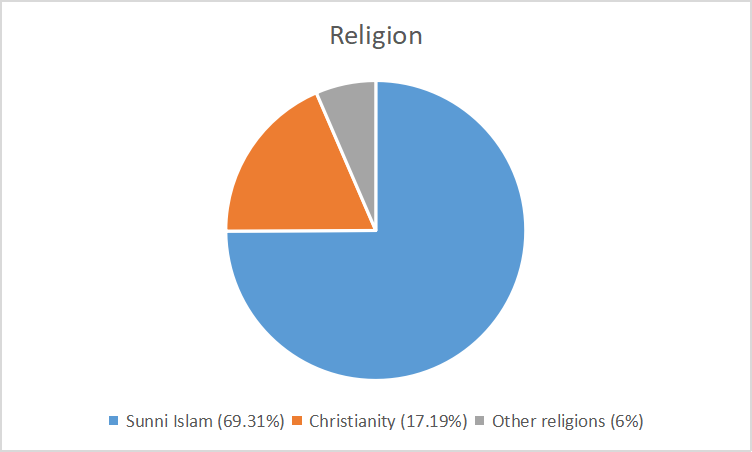
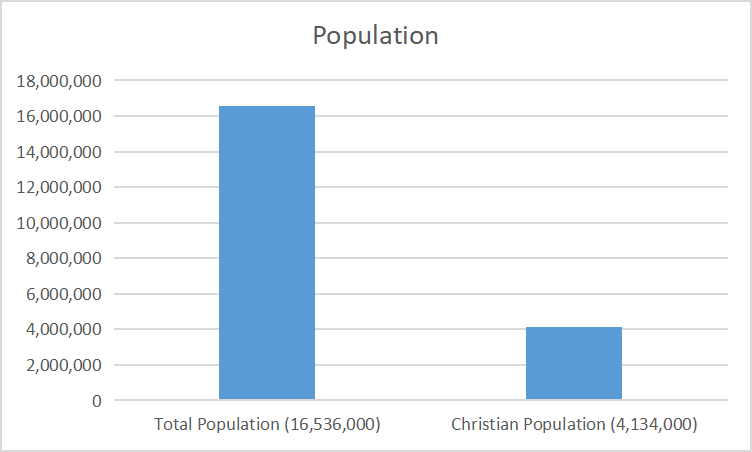
One of the challenges facing Christians in Kazakhstan is the rise of nationalism. In recent years, there has been an increase in anti-Russian sentiment in Kazakhstan. This has led to some discrimination against Russian-speaking Christians, who make up a large portion of the Christian population.
Another challenge facing Christians in Kazakhstan is the lack of religious freedom. The Kazakh government has been criticized for its restrictions on religious freedom. For example, the government requires all religious organizations to register with the state, and it has banned some religious groups.
11. Malaysia
Malaysia is a Southeast Asian country with a diverse population. The majority of the population is Muslim, but there is also a significant Christian minority. Christians in Malaysia come from a variety of ethnic and linguistic backgrounds, with the largest Christian groups being the Chinese and Indian communities.
Christianity in Malaysia is growing. In 2010, a census found that 9.10% of Malaysians identified as Christian. This is up from 8.2% in 1991. The growth of Christianity in Malaysia can be attributed to a number of factors, including the rise of evangelical Christianity, the increasing acceptance of Christianity by Malaysian society, and the influx of foreign workers from Christian-majority countries.

Christianity plays an important role in Malaysian society. Christians are involved in a variety of fields, including education, healthcare, and business. Christians are also active in social work and charity.
Malaysia’s religious landscape is marked by a harmonious coexistence of various faiths. The Malaysian Constitution guarantees freedom of religion, and the government has a long-standing policy of religious tolerance. However, there have been some challenges to religious freedom in recent years, with some Muslim groups calling for stricter Islamic laws and restrictions on other religions.
Despite these challenges, the Christian community in Malaysia continues to grow and thrive. Christians in Malaysia play an important role in society, and they are committed to working with other religious groups to promote peace and harmony.
12. Japan
Christianity is a minority religion in Japan, with only about 2% of the population identifying as Christian. However, Christianity has been present in Japan for over 400 years, and it has played a significant role in Japanese history and culture.
The first Christian missionaries arrived in Japan in the 16th century. They were initially welcomed by the Japanese government, which saw Christianity as a way to modernize and trade with the West. However, the government soon became suspicious of Christian missionaries, and Christianity was banned in 1614.
Despite the ban, Christianity continued to be practiced in Japan in secret. In the 19th century, Japan reopened its borders to the West, and Christianity was once again allowed to be practiced openly.
Since then, Christianity has grown slowly but steadily in Japan. Today, there are over 2 million Christians in Japan. They come from a variety of ethnic and linguistic backgrounds, but the largest Christian group in Japan is the Protestant churches.
13. Uzbekistan
Uzbekistan is a Muslim-majority country in Central Asia. However, it also has a small Christian minority, which makes up about 3% of the population. The majority of Uzbek Christians are Orthodox Christians, but there are also small communities of Protestants and Catholics.
Christianity has been present in Uzbekistan for centuries. However, it was suppressed during the Soviet era. Since the collapse of the Soviet Union in 1991, Christianity has been allowed to grow freely in Uzbekistan. However, Christians in Uzbekistan still face some discrimination.
For example, in 2017, a group of Uzbek Christians were arrested and charged with extremism for meeting in a private home to pray. The charges were later dropped, but the incident highlights the challenges that Christians in Uzbekistan face.
Despite the challenges, Christianity is growing in Uzbekistan. This is due in part to the work of foreign missionaries, who have been allowed to operate in Uzbekistan since the collapse of the Soviet Union. Additionally, some Uzbek Muslims are converting to Christianity, drawn by its message of love and forgiveness.
14. Pakistan
Christianity is a minority religion in Pakistan, with only about 1.5% of the population identifying as Christian. The majority of Pakistani Christians are Catholics, but there are also significant Protestant communities. Christianity has been present in Pakistan for over 2,000 years, but it has always been a minority religion.
Christians in Pakistan face discrimination and persecution. They are often the target of violence, and their churches and homes are frequently attacked. For example, in 2013, a mob of Muslims attacked a Christian church in Lahore, killing 76 people. The attack was the deadliest against Christians in Pakistan’s history.
Despite the challenges, Christians in Pakistan remain resilient. They play an important role in Pakistani society, and they are committed to living out their faith in a difficult environment.
15. Sri Lanka
In Sri Lanka, Christians make up about 8% of the population. The majority of Sri Lankan Christians are Catholics, but there are also significant Protestant communities. Christianity has been present in Sri Lanka for over 500 years, and it has played a major role in the country’s history and culture.
For example, Christians played a leading role in the Sri Lankan independence movement. Additionally, Christians have made significant contributions to Sri Lanka’s education, healthcare, and social welfare systems.
Christianity coexists with Buddhism in Sri Lanka, where Theravada Buddhism holds a prominent position. Christians and Buddhists have generally lived together in harmony, but there have been some periods of tension and violence.
16. Myanmar
In Myanmar, Christians make up about 6.2% of the population. The majority of Burmese Christians are Baptists, but there are also significant Catholic and Protestant communities. Christianity has been present in Myanmar for over 200 years, and it has played a major role in the country’s history and culture.
For example in Myanmar, Christians contributed to the Burmese independence movement. Additionally, Christians have made significant contributions to Burma’s education, healthcare, and social welfare systems.
In recent years, Christians in Myanmar have faced persecution from the Buddhist majority. This persecution has included violence against Christians, the destruction of churches, and forced conversions to Buddhism.
17. Iraq
In Iraq, Christians make up about 4% of the population. The majority of Iraqi Christians are Chaldean Catholics, but there are also significant Assyrian and Armenian Christian communities. Christianity has been present in Iraq for over 2,000 years, and it has played a major role in the country’s history and culture.
However, Christians in Iraq have faced persecution for centuries. In recent years, the persecution of Christians in Iraq has intensified, due to the rise of the Islamic State of Iraq and Syria (ISIS). ISIS has targeted Christians for violence and expulsion, and it has destroyed many Christian churches and monasteries.
Despite the persecution, Christians remain an important part of Iraqi society. They are involved in a variety of fields, including education, healthcare, and business. Christians are also active in social work and charity.
Sri Lanka, Myanmar, and Iraq are three countries with diverse religious populations. Christianity is a minority religion in all three countries, but it plays a significant role in each society.
18. Timor-Leste
Timor-Leste is a small country in Southeast Asia with a population of just over 1 million people. Christianity is the dominant religion in Timor-Leste, with over 98% of the population identifying as Christian. The vast majority of Timorese Christians are Catholics.
Christianity was introduced to Timor-Leste by Portuguese missionaries in the 16th century. The Catholic Church played a major role in the development of Timorese society and culture. For example, the Church established schools and hospitals, and it provided social services to the poor and marginalized.
During the Indonesian occupation of Timor-Leste from 1975 to 1999, the Catholic Church played a leading role in the resistance movement. The Church provided shelter and support to Timorese refugees, and it spoke out against the Indonesian military’s human rights abuses.
Since independence in 1999, the Catholic Church has continued to play an important role in Timorese society. The Church is involved in a variety of fields, including education, healthcare, and social work. The Church is also active in promoting peace and reconciliation in Timor-Leste.
19. Singapore
Singapore is a multi-racial and multi-religious country with a population of over 5.6 million people. Christianity is the third-largest religion in Singapore, with over 18% of the population identifying as Christian. The majority of Singaporean Christians are Protestants, but there is also a significant Catholic minority.
Christianity was introduced to Singapore by British missionaries in the early 19th century. The Christian churches played an important role in the development of Singaporean society and culture. For example, the churches established schools and hospitals, and they provided social services to the poor and marginalized.
Today, Christianity plays an important role in Singaporean society. Christians are involved in a variety of fields, including business, government, and education. Christians are also active in promoting social justice and interfaith dialogue.
20. Taiwan
Over 22.9 million people live in Taiwan, an East Asian island. Only 4.5% of Taiwanese are Christian. A large Catholic minority exists in Taiwan, where most Christians are Protestant.
Dutch missionaries brought Christianity to Taiwan in the 17th century. Christian growth in Taiwan began in the late 19th century. Japanese colonial authorities suppressed Christianity (1895-1945). After WWII, Christianity grew anew.
Christianity is minor in Taiwanese society. Christians work in many sectors, but they are underrepresented in power and influence.
Christianity has shaped Taiwanese society despite its minority status. Christian churches have influenced education, healthcare, and social work. Taiwanese Christians have promoted democracy and human rights.
Schools and colleges are one of Christianity’s greatest contributions to Taiwan. Christian schools have long been distinguished for their academic excellence and Christian ideals. Christians built National Chengchi University and National Chung Hsing University, two of Taiwan’s top universities.
Taiwanese Christian churches have also contributed to healthcare. All faiths have received high-quality treatment from Christian hospitals and clinics. Christian missionaries created Taiwan’s top hospitals, including Mackay Memorial Hospital and Tzu Chi Medical Center.
Top 5 Christian Countries in Asia
Christianity is a diverse and growing religion in Asia. The top 5 Christian countries in Asia are:
- Philippines (85.3%)
- Russia (73.6%)
- Indonesia (10.48%)
- China (3-5%)
- South Korea (29.2%)
These countries represent a wide range of cultures and ethnicities, and Christianity plays a significant role in each society. Christians in these countries are involved in a variety of fields, including business, government, and education. They are also active in promoting social justice and interfaith dialogue.
Despite the challenges that Christians face in some parts of Asia, Christianity is a growing religion in the region. The top 5 Christian countries in Asia are a testament to the diversity and vitality of Christianity in Asia.
Christian Countries in Asia by Region
Christianity is a diverse and growing religion in Asia. It plays an important role in many Asian societies, and it is likely to continue to grow in importance in the years to come.
Here is a brief overview of Christian countries in Asia by region:
- Southeast Asia: Philippines, Indonesia, Timor-Leste, Singapore
- South Asia: India, Pakistan, Sri Lanka
- East Asia: China, South Korea, Taiwan
- Central Asia: Kazakhstan, Uzbekistan
- West Asia: Armenia, Georgia, Iraq
These countries represent a wide range of Christian denominations and traditions. For example, the Philippines is predominantly Catholic, while South Korea is predominantly Protestant. China has a growing Christian population, but it is still a minority religion.
Challenges Facing Christians in Asia
Christianity is facing a number of challenges in Asia, including religious persecution, discrimination, poverty, and lack of access to education and healthcare.
- Religious persecution: Christians in some Asian countries are persecuted for their faith. This persecution can take many forms, including violence, harassment, and discrimination.
- Discrimination: Christians in some Asian countries are discriminated against because of their faith. This discrimination can affect their access to education, employment, and housing.
- Poverty: Many Christians in Asia live in poverty. This poverty can make it difficult for them to access basic necessities such as food, water, and healthcare.
- Lack of access to education and healthcare: Christians in some Asian countries do not have access to quality education and healthcare. This can make it difficult for them to improve their lives and the lives of their children.
Despite these challenges, Christianity continues to grow in Asia. Christians in Asia are resilient and determined to live their faith freely. They are working to build a better future for themselves and their communities.
Conclusion: The Future of Christianity in Asia
Christianity in Asia is on the rise. The continent is home to the fastest-growing Christian population in the world, and by 2050, Asia is projected to have more Christians than any other continent. This growth is being driven by a number of factors, including:
- The rapid urbanization of Asia
- The increasing prosperity of many Asian countries
- The growing acceptance of Christianity in Asian societies
Christianity is also becoming more diverse in Asia. In the past, Christianity was largely associated with Western missionaries and colonial powers. However, today, Asian Christians are increasingly coming from a variety of ethnic, cultural, and linguistic backgrounds. This diversity is enriching the Christian faith in Asia and making it more appealing to new converts.
As Christianity grows in Asia, Christian communities are becoming more and more vibrant. Christians are playing an increasingly important role in their societies, and they are working to make the world a better place. Christians in Asia are involved in a variety of fields, including business, education, healthcare, and government. They are also active in social work and charity.
Frequently Asked Questions
This section provides answers to some of the most frequently asked questions about Top 20 Christian Countries in Asia. If you have any other questions, please do not hesitate to contact us.
1. What is the largest Christian country in Asia?
The Philippines is the largest Christian country in Asia, with over 85% of the population identifying as Christian. Christianity was introduced to the Philippines by Spanish missionaries in the 16th century, and it quickly became the dominant religion in the country. Today, the Philippines is one of the most Catholic countries in the world.
2. What is the fastest-growing Christian population in Asia?
South Korea has one of the fastest-growing Christian populations in the world. In the past 50 years, the percentage of Christians in South Korea has increased from less than 5% to over 29%. This growth is due to a number of factors, including the work of missionaries, the appeal of the Christian message, and the search for meaning and purpose in life.
3. What are the main denominations of Christianity in Asia?
The main denominations of Christianity in Asia are Catholicism, Protestantism, and Orthodoxy. Catholicism is the largest Christian denomination in Asia, with over 130 million Catholics. Protestantism is also a major denomination in Asia, with over 100 million Protestants. Orthodoxy is a smaller denomination in Asia, with over 30 million Orthodox Christians.
4. What are the contributions of Christians to Asia?
Christians have made significant contributions to Asia in the areas of education, healthcare, social welfare, and the arts. Christian missionaries founded many of the first schools and hospitals in Asia. Christians have also been active in providing social services to the poor and marginalized. And Christian artists have made significant contributions to Asian culture and society.
5. What are the different types of Christian churches in Asia?
There are a variety of different types of Christian churches in Asia. The largest Christian denomination in Asia is Catholicism, so there are many Catholic churches in Asia. There are also many Protestant churches in Asia, including Baptist churches, Methodist churches, and Presbyterian churches. And there are also a number of Orthodox churches in Asia.
6. How do Christians in Asia celebrate religious holidays?
Christians in Asia celebrate religious holidays in a variety of ways. Some Christians attend church services on religious holidays, while others celebrate at home with their families. Some Christians also participate in special events and festivals on religious holidays. For example, many Christians in Asia celebrate Christmas by attending church services, singing Christmas carols, and giving and receiving gifts.
7. What are the different ways that Christians in Asia engage in social justice work?
Christians in Asia engage in social justice work in a variety of ways. Some Christians work through churches and other religious organizations to provide food, shelter, and other assistance to the poor and marginalized. Other Christians work through NGOs and other secular organizations to promote human rights and social justice. And still other Christians work through their own personal lives to promote love, compassion, and justice in their communities.

